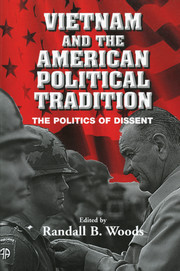Book contents
- Frontmatter
- Contents
- List of Contributors
- Introduction
- Anti-Imperialism in U.S. Foreign Relations
- World War II, Congress, and the Roots of Postwar American Foreign Policy
- The Progressive Dissent: Ernest Gruening and Vietnam
- “Come Home, America”: The Story of George McGovern
- Congress Must Draw the Line: Senator Frank Church and the Opposition to the Vietnam War and the Imperial Presidency
- Dixie's Dove: J. William Fulbright, the Vietnam War, and the American South
- Advice and Dissent: Mike Mansfield and the Vietnam War
- The Reluctant “Volunteer”: The Origins of Senator Albert A. Gore's Opposition to the Vietnam War
- A Delicate Balance: John Sherman Cooper and the Republican Opposition to the Vietnam War
- Friendly Fire: Lyndon Johnson and the Challenge to Containment
- Richard Nixon, Congress, and the War in Vietnam, 1969–1974
- Index
Advice and Dissent: Mike Mansfield and the Vietnam War
Published online by Cambridge University Press: 21 November 2009
- Frontmatter
- Contents
- List of Contributors
- Introduction
- Anti-Imperialism in U.S. Foreign Relations
- World War II, Congress, and the Roots of Postwar American Foreign Policy
- The Progressive Dissent: Ernest Gruening and Vietnam
- “Come Home, America”: The Story of George McGovern
- Congress Must Draw the Line: Senator Frank Church and the Opposition to the Vietnam War and the Imperial Presidency
- Dixie's Dove: J. William Fulbright, the Vietnam War, and the American South
- Advice and Dissent: Mike Mansfield and the Vietnam War
- The Reluctant “Volunteer”: The Origins of Senator Albert A. Gore's Opposition to the Vietnam War
- A Delicate Balance: John Sherman Cooper and the Republican Opposition to the Vietnam War
- Friendly Fire: Lyndon Johnson and the Challenge to Containment
- Richard Nixon, Congress, and the War in Vietnam, 1969–1974
- Index
Summary
Mike Mansfield came to Congress in 1943 as the United States put aside isolationism to forge military commitments around the globe. Part of a generation shaped by Munich and Pearl Harbor, Mansfield accepted as imperatives international resistance to aggression, strong presidential leadership, and a bipartisan foreign policy. The United States, he believed, emerged from World War II with a moral vision and a sense of national purpose. “Our goal was the defense of liberty, and the triumph of political and economic freedom.” Immediately after the war, when the nation had been the most powerful, “we were in our most cooperative and international mode, showing a decent respect for the opinions of others, and seeking their cooperation and support.” He considered it a great irony that as other nations grew economically and militarily stronger relative to the United States in the 1960s and 70s, “we started to try to change the world on our own.”
Those who observed him most closely found Mansfield difficult to define. Taciturn, retiring, and contemplative in nature, this “deceptively mild” man could turn forceful in asserting his convictions. A politician who was “not a compulsive seeker of power”and “not all-consumed with politics,” he held onto the reigns of political power longer than any other Senate majority leader. A party leader who shunned excessive partisanship, he exerted a unique moral authority over colleagues from both parties.
- Type
- Chapter
- Information
- Vietnam and the American Political TraditionThe Politics of Dissent, pp. 171 - 203Publisher: Cambridge University PressPrint publication year: 2003
- 1
- Cited by

